I Compared Instrumentl to GrantStation to Find and Manage My Grants: Here’s My Verdict
My name is Rachel Hector and I am a grant writing consultant at Capacita Consulting, helping nonprofits strengthen and sustain their grants strategy. I am currently working with a nonprofit client based in Chicago that provides housing and wrap-around services for youth experiencing homelessness.
My grants team is looking to find opportunities to fund their supportive services, with an emphasis on funding that is flexible and can help meet participants’ urgent and unforeseen needs. The goal is to fund a budget gap for their supportive services of approximately $50,000.
While finding new sources of funding can be challenging—especially when that funding needs to respond to discrete participant needs—there are a variety of online grant research tools that are designed to streamline the prospecting process. I’ll be starting my search by comparing GrantStation and Instrumentl and analyzing each platform’s ability to help me identify high-quality, relevant funding opportunities.
My Experience Using Instrumentl
Instrumentl is a comprehensive grant platform that combines grant discovery, management, and reporting into one centralized tool. Instrumentl’s database hosts over 25,000 active private and public funding opportunities that are updated on a weekly basis, helping nonprofits find relevant grant opportunities to sustain and grow their programs.

Instrumentl’s database is accessible through the account dashboard, where users can find new grant opportunities, track deadlines and submissions, and plan ahead in alignment with their organization’s grant strategy.
The first step of a grant search in Instrumental is to create a new project, which is similar to a saved search. Creating a project allows users to find grants for individual projects and programs within their organization. It also makes it easy for consultants to search for grants across clients with disparate missions. I created my project by selecting the “+ Project” button at the top left corner of the screen just below the search bar.
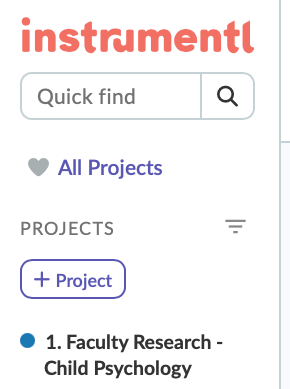
Once selected, I was prompted to provide several pieces of information about the project I am fundraising for and the types of grants I would like to find, including:
- Project Name;
- Project Keywords, or the project’s field(s) of work or key issue areas addressed. I selected queries that included homelessness services, youth services, and supportive housing & shelters;
- Applicant Type, such as nonprofit, school, hospital, museum, university, indigenous group, or other entity. My client is a nonprofit 501(c)3 that provides supportive housing services for youth, so I selected nonprofit;
- Geographic Focus, such as the location of the project and/or geographic region served. My client is located in and exclusively serves youth in the city of Chicago, so I selected Cook County and the state of Illinois;
- Grant Size, or the range of award sizes to search for. I selected a minimum of $5,000 and a maximum of $100,000;
- What funds will be used for, such as general operating support, project /program, capacity building, education/outreach, and other use cases. I selected project/program and general operating support; and
- Type of funders (Private Foundations, Associations, State and Federal Government, Corporate). I selected all except the State and Federal Government. The program is in greatest need of non-restrictive dollars and government grants are typically restrictive in how they can be used.
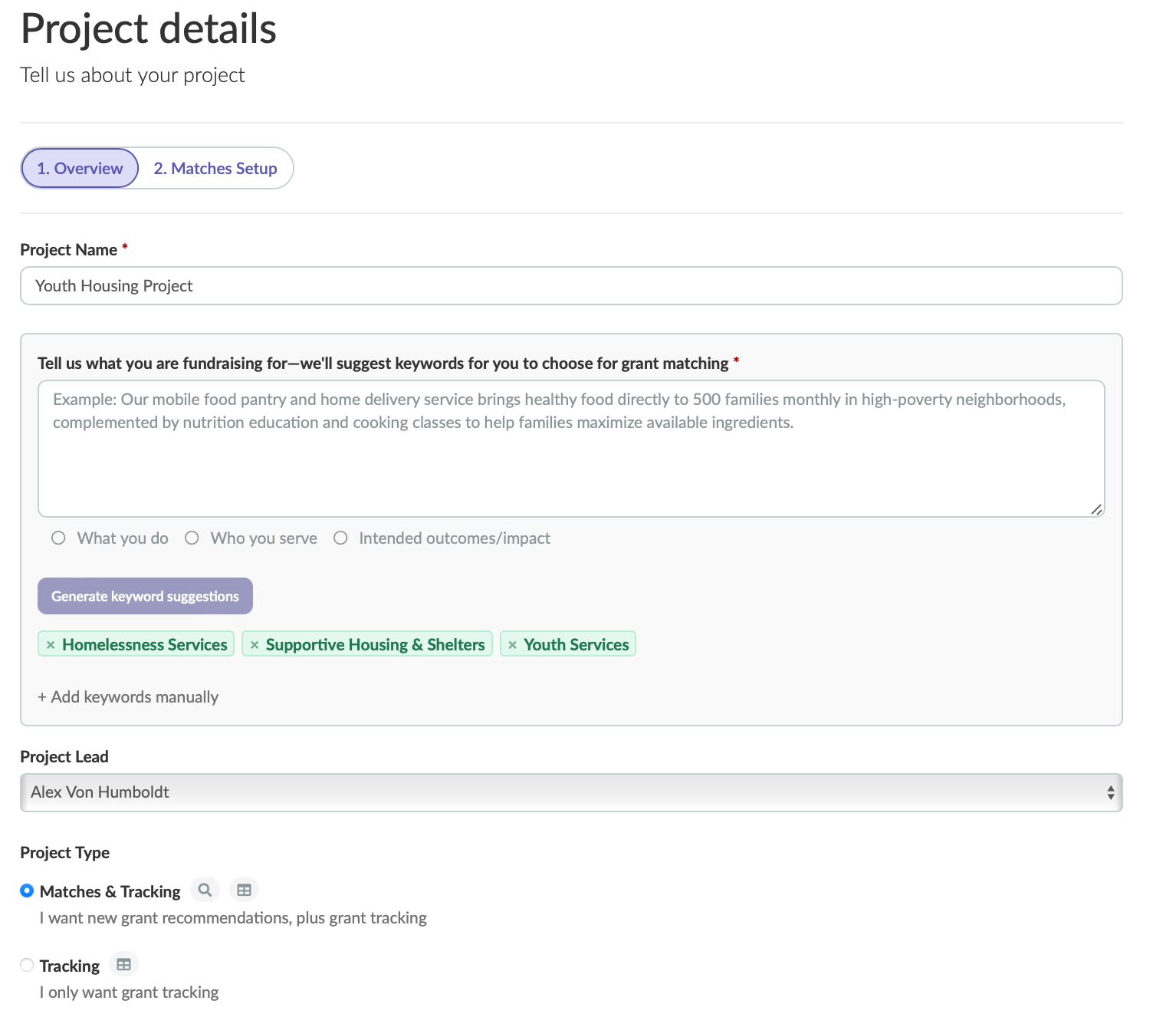
With all this information entered, I started the search!
The results were almost immediate, taking only a few moments to pull up hundreds of opportunities. Upon my initial review, I was excited to see the sheer number of results that Instrumentl pulled up. In total, Instrumentl matched me with 365 grant opportunities.
One of the aspects of Instrumentl’s search engine I liked most was the option to filter results by field of work, geography, past giving, and funder type. This allowed me to narrow down results so I could prioritize looking through the most well-aligned opportunities.

The grants I was matched with ended up being very relevant to the program I was searching for. There were a number of geographically-specific and programmatically-relevant opportunities as well as several major funders that I already knew were interested in the work I was looking to fund.
I was also introduced to several opportunities I was unfamiliar with but seemed like they would be strong opportunities to pursue. Instrumentl’s 990 snapshot tool provided an overview of the funder’s priorities, funding history, geographic preference, and other high-level information that made analyzing each grantmaker efficient and easy. Where applicable, Instrumentl also provided a detailed overview of open RFPs and grant opportunities with relevant guidelines, eligibility requirements, grant ranges, and deadlines.
To track the well-aligned grant opportunities I found, I saved the opportunities to the project grant tracker by selecting the grant opportunity and clicking the “Save” button at the bottom right hand corner of the dashboard. Each saved opportunity was immediately transferred to the grants tracker, which I can use to plan upcoming applications.

Overall, I appreciated the speed and ease with which I was able to search and identify hundreds of potential grants and quickly begin tracking relevant opportunities. I also enjoyed how Instrumentl keeps everything centralized in its dashboard, making it simple to click between matches and the tracker without opening new windows or jumping back and forth between different documents.
My Experience Using GrantStation
GrantStation is an online platform that helps educational institutions, nonprofits, religious institutions, individual grantseekers, and government agencies discover and manage grant opportunities. Through their membership, users gain access to their grantseeking services and other resources including educational offerings, insights based on surveys of thousands of nonprofit organizations, and professional development support.
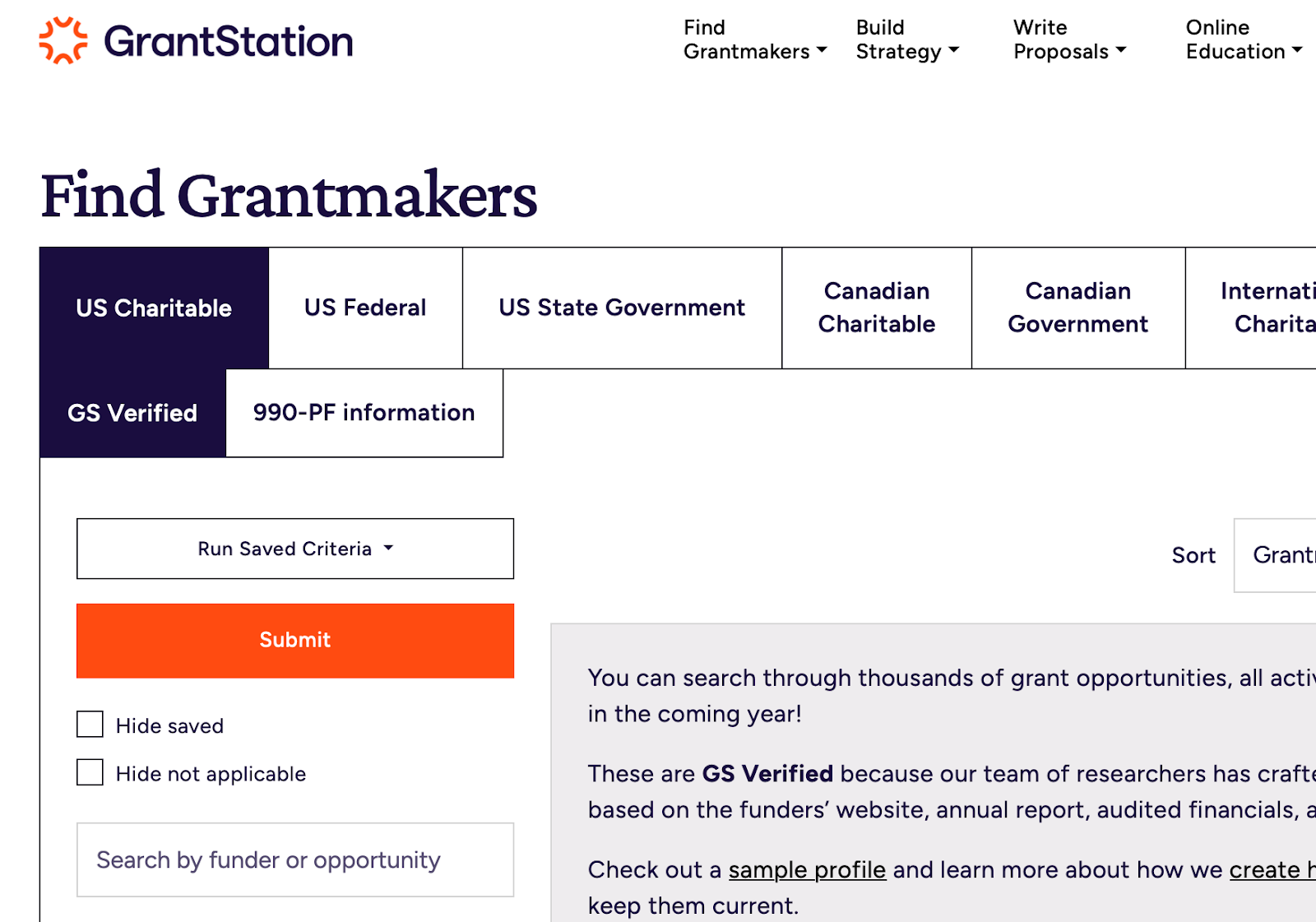
To begin my search, I selected the “Find Grantmakers” drop-down menu on GrantStation’s homepage, and then selected “US Charitable” to focus on family foundations, corporate grantmakers, and other private funding opportunities.
I started by selecting various keywords and criteria from drop-down menus on the left hand side of the page, including:
- Geographic scope. GrantStation’s geographic specificity allows users to search by state so I selected ‘Illinois’;
- Areas of interest. GrantStation offers a large variety of keyword options for area of interest so in an attempt to capture as many opportunities as possible I selected Housing, At-risk youth, homelessness, children/youth, and healthcare delivery/access;
- Types of support. I selected general operating support and project/program support;
- Application deadline date. I selected deadlines within the next 180 days;
- Type of grantmaker. I selected Association or Society, Community Foundation, Corporate Foundation, Foundation, Fund or Trust, and Giving Circle; and
- Location of grantmaker. I selected Illinois.
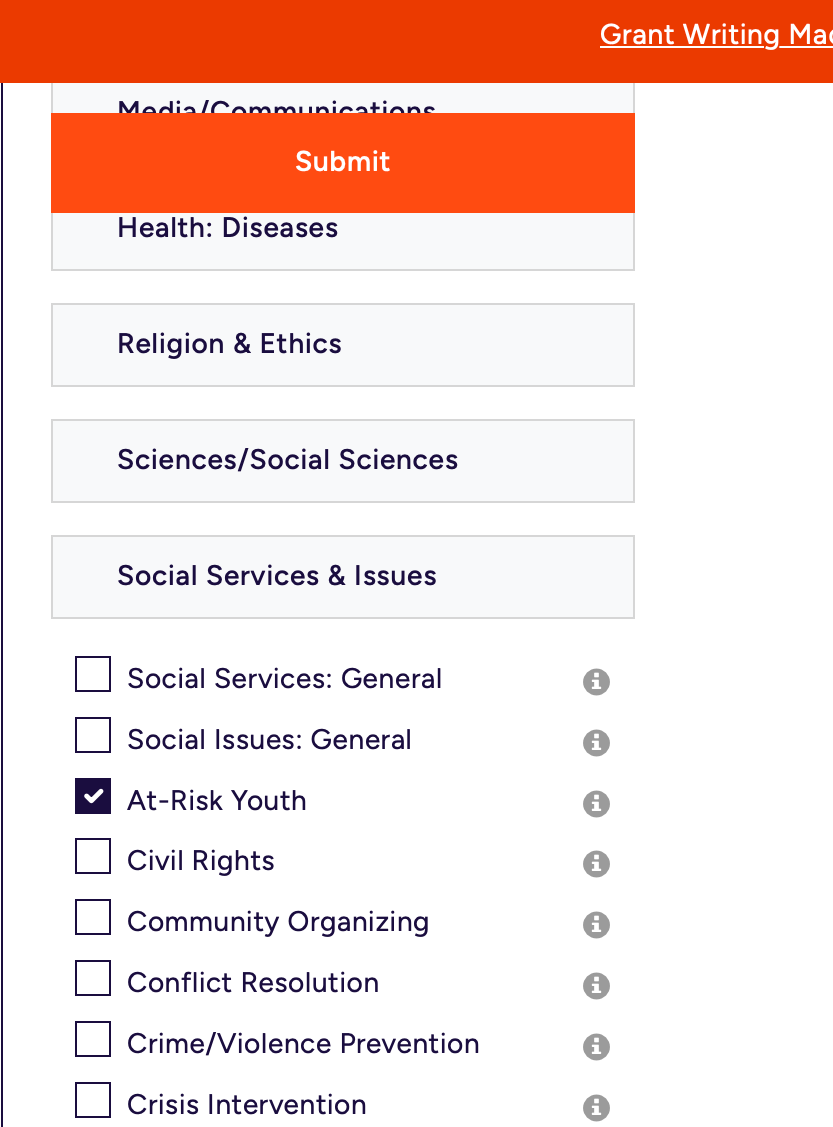
With these filters selected, I started the search!
Upon completing the query, I was initially disappointed by the number of matches that were returned. In total, GrantStation brought up 11 matches. While the results were limited, there were several that appeared to be a good match with strong geographic and programmatic alignment. However, because GrantStation does not allow for specificity of geographic scope beyond the state, a number of the results that came up were for counties outside of Cook County and well outside the scope of the Chicagoland area.

Despite the limited results, the overall user interface was intuitive, and the listings provided a sufficient amount of high-level information that made prioritizing the matches very simple and easy. Each of the funder profiles included detailed information about each opportunity and funder stats, including past grants awarded and grant size as well as eligibility details, restrictions, and guidelines.
One pain point was GrantStation’s “Projects” function, which was not readily accessible and took some time to figure out. After saving the opportunities I identified as a strong fit, it took some time to navigate to the specific project and organize the opportunities for planning and further research.
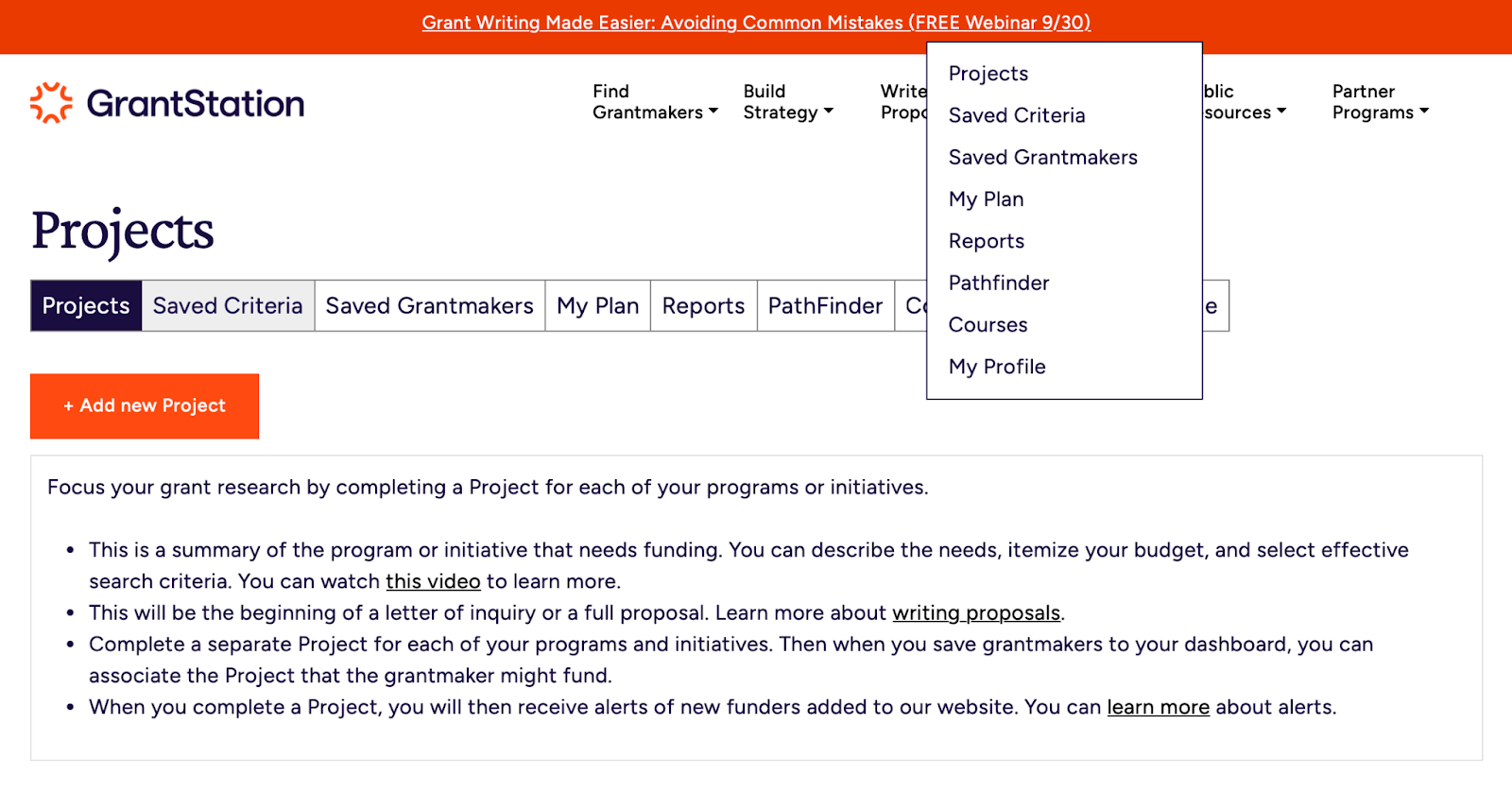
Comparison Table
Final Thoughts and Recommendations
After comparing both platforms, I found that Instrumentl was likely the tool that would best support my grantseeking efforts over the long term.
While GrantStation had an aesthetically pleasing and simple user interface, it was lacking some specificity and scope that kept the final grant query from providing sufficient results. The initial downside that stuck out to me was the inability to filter opportunities by specific geographic service area, such as county or city. I believe that this may have returned several results that were misaligned.
One of the features on GrantStation I appreciated was the diversity of filters that could be selected for the search. While only a few results were provided, it is nice to see that the platform can pull up very specific matches based on a wide range of keywords.
However, it was difficult to determine whether more or less keywords and filters would have returned better results from my initial GrantStation search. I would be interested to run another search with different keywords and either less or more filters to determine if this would have any impact on the types of results I pulled up.
The two things I liked best about Instrumentl were the number of opportunities it matched me with and the interface’s centralized layout. When researching grants, I prefer to review several hundred opportunities that might be well aligned and filter from there, doing a quick skim of high-level information to determine if further analysis is needed. While this might take more time, at the end of the day it is covering opportunities I may have never heard of or found otherwise.
Within Instrumentl’s platform, I love the ability to quickly jump back and forth between a project’s grant matches and the grant tracker, making the transition from grant research to grant management seamless. Grant research and discovery can feel like a daunting task but with Instrumentl, it felt effortless.

.svg)



